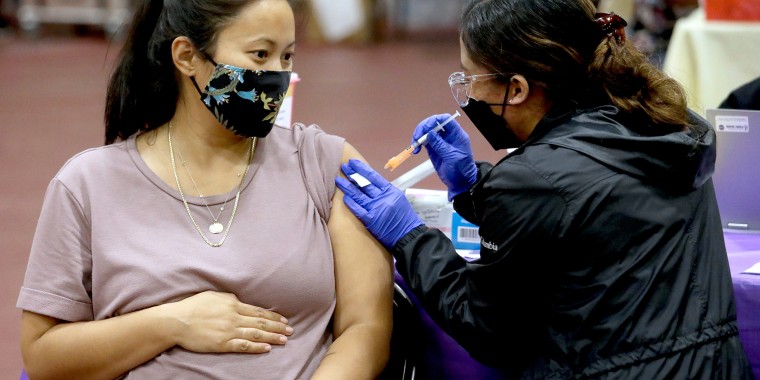Now that COVID-19 vaccine boosters are dominating the conversation when it comes to staying protected against the new coronavirus, pregnant people may be wondering if they should get the extra dose.
The answer is “definitely, yes, yes, yes,” Dr. Iffath Hoskins, an OB-GYN at NYU Langone Medical Center in New York and president-elect of the American College of Obstetricians and Gynecologists, told TODAY.
But turning the conversation to boosters may be premature right now since the main concern remains that too few expectant parents are getting vaccinated against COVID-19 in the first place — only one-third of the pregnant population has gotten the shot or two-shot series, she said.
“It’s very serious, very concerning. We have a long way to go,” Hoskins warned.
“Every pregnant woman should get the vaccine. (Then) of course she should get the booster because she’s immune compromised.”
Both ACOG and the Society for Maternal-Fetal Medicine recommend a booster shot during pregnancy. Advice from the Centers for Disease Control and Prevention aligns with those organizations.
All pregnant people are considered to be immunocompromised
The immunity of expectant parents is weakened because they are accepting the growing fetus inside them — a brand new person that would otherwise be rejected by their body, Hoskins said.
“So her immune system needs to be very tamped down, very low so she doesn’t reject this pregnancy and that’s the survival of mankind,” she noted.
“With the COVID situation, we know that low immunity is one of the risk factors that might make a person susceptible to getting infected… in pregnant women, it’s life-threatening. They get sicker. They are more likely to need ventilators. They’re more likely to have very serious complications because their immune system is down.”
With the protection provided by the COVID-19 vaccine potentially decreasing over time, the booster can rev up immunity again — “it’s like a battery jump start,” Hoskins said.
When should a pregnant person get a booster?
For those who are pregnant, 18 or older and received the Pfizer-BioNTech or Moderna vaccines, a booster is recommended six months after completing the initial two-shot series.
For a pregnant person who is 18 or older and received Johnson & Johnson COVID-19 vaccine, a booster shot is recommended two or more months after the initial dose.
They can choose which vaccine they receive as a booster dose and either stick with the brand they already received or “mix and match” with a different brand. So far, about 76% of Johnson & Johnson recipients have received a different vaccine for the booster.
Boosters — as well as the initial vaccines — can be given at any time during pregnancy, the Society for Maternal-Fetal Medicine noted.
The first trimester is a critical window of time when doctors traditionally want women to be extra careful and not take a chance with anything, Hoskins said. But there’s been no guidance instructing women to avoid the vaccine or booster in the first trimester.
“Being very, very sick on death’s doorstep is the worst choice, so if you get an opportunity to get the vaccine, no matter what the calendar says where you are in your pregnancy, take it, and whichever one you can get, take it,” she noted.
“We’re not counting the trimesters because getting sick is awful.”
Is the booster safe for pregnant women?
Evidence about the safety of COVID-19 vaccination during pregnancy suggests the benefits outweigh any known or potential risks, the CDC noted.
When it comes to getting a booster, “there is no issue so far based on everything we know,” Hoskins said.
What side effects should pregnant women expect from a booster?
Since the booster is reawakening the immune system, plan on possible flu-like symptoms — fatigue, muscle aches, fever, runny nose, headache or foggy brain.
“By the time you get the third (shot), because you’re getting such a robust response and nobody can predict how robust, how high, how much, you may feel really sick because it’s the revving up of your system,” Hoskins noted.
As always, it all depends on the person — some people might not notice any side effects, she added.
What are the benefits for the fetus?
If the expectant parent is better protected against the new coronavirus thanks to the booster, the growing baby is going to be automatically protected, too, “because if she doesn’t get COVID, the kid is not going to get COVID,” Hoskins said.
And when a pregnant person makes antibodies, they pass through the placenta to the fetus, who will arrive into the world with some protection.
Bottom line:
“We are saying not only should you get the vaccine, which is the gold standard and the single most important thing, but you also should get a booster,” Hoskins advised pregnant women.
“The worst thing is zero vaccination. That’s the most dangerous.”

